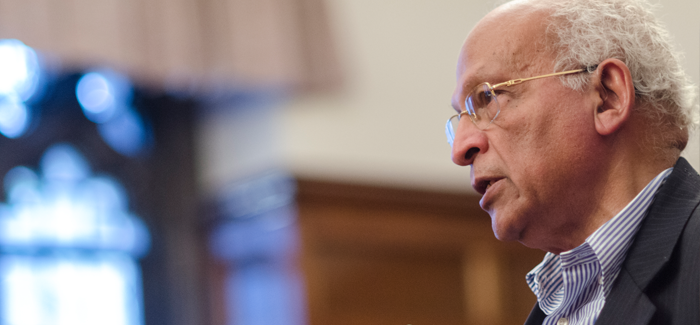
Gamal Al Ghitany speaks at a daylong workshop, “Then, Now, and the Arabic Novel,” in November. (Photography by Megan E. Doherty, AM’05, PhD’10)
Visiting novelist Gamal Al Ghitany discusses the state of creativity in Egypt.
Egyptian writer Gamal Al Ghitany is the Mellon Islamic Studies Initiative visiting professor of practice this quarter. He is the author of more than 50 books of fiction, the best known of which is Zayni Barakat, a novel about the last days of Egypt’s Mamluk dynasty that was translated into English by the University’s Farouk Abdel Wahab. I visited his office in a corner of Swift Hall on a snowy day in late November to ask some questions—and get him to sign my copy.
Is this the first time you’ve been at the University for an extended period?
I came here in May to speak at Farouk Abdel Wahab’s memorial service. But this is the first time I’ve come for a long stay. Teaching a course—The Novel and Classical Arabic Heritage in Contemporary Egyptian Literature—is new for me, and I’ve enjoyed the students and the whole university.
I know you’re writing a lot of journalistic and commentary pieces these days. Do you still have time to write fiction?
All my life, I divided my time to work as a journalist—and before that as a designer of carpets. I usually start writing fiction at about 6, 7 p.m., and continue until midnight. I can’t give all my time to literature. Because, you know, no Arabic writer can live from his books alone.
Not too many American writers either. Can you tell me a little bit about the fiction you’re working on?
Several years ago I started working on a very big project, where I try to invent life from memory. The title in French is Cahiers de Memoire (Reminiscences, or, literally, Memory Reports). It’s not intended to be a documentary, not reality. For example, yesterday, I was writing about the days of war, when I was a military correspondent during the war between Egypt and the Israelis in 1967. I try to write about the moment in which I saw things 40, 45 years ago, as I see them now. It’s very difficult.
Who would you say are some of the younger novelists from Egypt who could make an impact the way you or Naguib Mahfouz has, or Alaa Al Aswany have?
In literature now there are many, many writers. I read new names constantly. But there is no credible critical movement. Unfortunately, in the last few years, publishing houses now mostly support the bestseller. All through our history, the bestseller has existed. But the deep literature, like Mahfouz, always had support too. Now, they say, “This is a good novel, but it will be hard for us to sell it.”
It’s just like here.
Yes. It is not good for deep literature, for high literature. But I think in the future there will be good new writing. Because usually after a big revolution, you take time to write the moment. The creation starts by the soul of the revolution.
